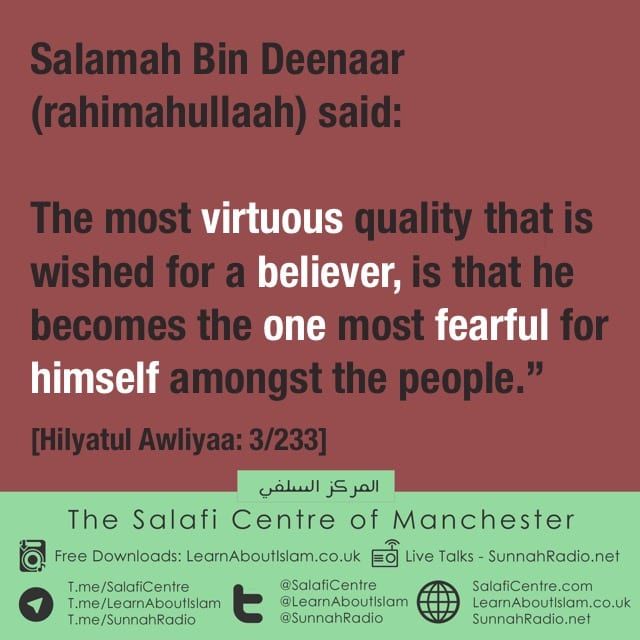Deviation from Upright Conduct and Deviation Related to Knowledge and Creed: Requires Prolonged, Constant, and Attentive Reflection
In The Name of Allaah, The Most Merciful, The Bestower of Mercy.
الغي والضلال يجمعان جميع السيئات
Al-Ghay: [to deviate from upright conduct] and Ad-Dalal: [misguidance related to knowledge and creed] combine all evils
Al-Allamah Rabee Bin Haadi Al-Mad’khali [may Allaah protect him] stated:
All Praise be to Allaah, Lord of the entire existence, and prayers and peace be upon the most honorable of the prophets and messengers, our Prophet Muhammad, and upon his family and companions. To proceed:
Presented to all Muslims is this [الكلام الرائع – wonderful, remarkable, speech] of Shaikh Al-Islam Ibn Taymiyyah, may Allah have mercy upon him, in which he spoke about the danger of Hasad (envy), and the danger of Ghay and Dalal, and that they combine all evils. Therefore, it is incumbent upon all to [مراقبة الله – i.e. to recall the fact that Allah sees us, knows everything about us at all times, knows everything in our souls etc], strive to correct our beliefs and purify our hearts from envy, arrogance, transgression and all kinds of sins, especially major sins. Here is the speech of this Imam, who, may Allah have mercy upon him, stated in his treatise (titled) at-Tawbah (repentance) pages 236-238:
Indeed, Allah commanded His believing servants to supplicate to Him in every prayer with His statement:
ٱهۡدِنَا ٱلصِّرَٲطَ ٱلۡمُسۡتَقِيمَ
صِرَٲطَ ٱلَّذِينَ أَنۡعَمۡتَ عَلَيۡهِمۡ غَيۡرِ ٱلۡمَغۡضُوبِ عَلَيۡهِمۡ وَلَا ٱلضَّآلِّينَ
Guide us to the straight path (of beneficial knowledge coupled with righteous action); the path of those (Prophets and their truthful, righteous followers) upon whom You have bestowed favour, not of those who earn Your anger (by not acting upon what they know) and nor of the astray (who act without knowledge). [Al-Faatihah. 6-7] [Noblequran-Shaikh Abu Iyaad]
And for this reason, Allah freed His Prophet from these two (i.e. Ghay and Dalal), saying:
وَٱلنَّجۡمِ إِذَا هَوَىٰ
مَا ضَلَّ صَاحِبُكُمۡ وَمَا غَوَىٰ
وَمَا يَنطِقُ عَنِ ٱلۡهَوَىٰٓ
إِنۡ هُوَ إِلَّا وَحۡىٌ۬ يُوحَىٰ
By the (phenomenon) of the star when it descends (and vanishes with the appearance of dawn). Your companion-(O Pagans of Quraysh)—has not erred (in the knowledge he has been given) nor has he erred (in his sincerity of purpose). Nor does he speak out of the desire (of his own soul) (and forge revelation thereby). It is nothing but revelation revealed to him (containing guidance, rectitude and piety which he follows). [Surah An-Najm. Aayaat 1-4] [NobleQuran -Shaikh Abu Iyaad]
[الضال – The misguided one]:
He is the one that does not know the truth, but rather thinks that he is upon the truth while he is ignorant of it, as is the case regarding what the Christians are upon. Allaah [The Exalted] said:
وَلَا تَتَّبِعُوا أَهْوَاءَ قَوْمٍ قَدْ ضَلُّوا مِنْ قَبْلُ وَأَضَلُّوا كَثِيرًا وَضَلُّوا عَنْ سَوَاءِ السَّبِيلِ
And do not follow the inclinations of a people who had gone astray before and misled many and have strayed from the soundness of the way. [Al-Ma’idah. 77]
And [الغاوي – the one who deviates from upright conduct] follows his whims and desires even though he knows that this is contrary to the truth, as is the case regarding what the Yahud are upon. Allah, The Most High, said:
سَأَصْرِفُ عَنْ آيَاتِيَ الَّذِينَ يَتَكَبَّرُونَ فِي الْأَرْضِ بِغَيْرِ الْحَقِّ وَإِنْ يَرَوْا كُلَّ آيَةٍ لَا يُؤْمِنُوا بِهَا وَإِنْ يَرَوْا سَبِيلَ الرُّشْدِ لَا يَتَّخِذُوهُ سَبِيلًا وَإِنْ يَرَوْا سَبِيلَ الْغَيِّ يَتَّخِذُوهُ سَبِيلًا ذَلِكَ بِأَنَّهُمْ كَذَّبُوا بِآيَاتِنَا وَكَانُوا عَنْهَا غَافِلِينَ
I shall turn away from My Ayat (verses of the Quran) those who behave arrogantly on the earth, without a right, and (even) if they see all the Signs, they will not believe in them. And if they see the way of righteousness (monotheism, piety, and good deeds), they will not adopt it as the Way, but if they see the way of error (polytheism, crimes and evil deeds), they will adopt that way, that is because they have rejected Our Signs and were heedless (to learn a lesson) from them. [Al-A’raf. 146]
Allah, The Most High, said:
وَاتْلُ عَلَيْهِمْ نَبَأَ الَّذِي آتَيْنَاهُ آيَاتِنَا فَانْسَلَخَ مِنْهَا فَأَتْبَعَهُ الشَّيْطَانُ فَكَانَ مِنَ الْغَاوِينَ
وَلَوْ شِئْنَا لَرَفَعْنَاهُ بِهَا وَلَكِنَّهُ أَخْلَدَ إِلَى الْأَرْضِ وَاتَّبَعَ هَوَاهُ فَمَثَلُهُ كَمَثَلِ الْكَلْبِ إِنْ تَحْمِلْ عَلَيْهِ يَلْهَثْ أَوْ تَتْرُكْهُ يَلْهَثْ
And recite (O Muhammad) to them the story of him to whom We gave Our Signs, but he threw them away, so Shaitan (Satan) followed him up, and he became of those who went astray. nd had We willed, We would surely have elevated him therewith but he clung to the earth and followed his own vain desire. So his description is the description of a dog: if you drive him away, he lolls his tongue out, or if you leave him alone, he (still) lolls his tongue out. [Al-A’raf. 175-176]
And in a hadith, the Prophet, peace and blessings of Allah be upon him, said:
“Indeed, what I fear most for you is the desires of the stomachs and privates parts that deviates a person from upright conduct, and the misleading trials”.
That is because indeed Ghay and Dalal combine all the evils of the children of Adam, because the human being is as Allah stated:
وَحَمَلَهَا الْإِنْسَانُ إِنَّهُ كَانَ ظَلُومًا جَهُولً
But man bore it. Verily, he was unjust (to himself) and ignorant (of its results)] [Al-Ahzab. 72]
So, through his wrongdoing, he becomes one who deviates from upright conduct, and through his ignorance, he becomes a misguided one. And often he combines both these two, this, he is misguided in one thing, and deviated from upright conduct in another thing, because he is unjust and ignorant, and each of the two sins succeed one another, as Allah said:
فِي قُلُوبِهِمْ مَرَضٌ فَزَادَهُمُ اللَّهُ مَرَضًا
In their hearts is a disease (of doubt, disbelief and hypocrisy), so Allāh increased their disease (by subjecting them to trials in which they preferred disbelief)]. [Al-Baqarah. 10] [NobleQuran-Shaikh Abu Iyaad]
And as Allah said:
فَلَمَّا زَاغُوا أَزَاغَ اللَّهُ قُلُوبَهُمْ
So when they turned away (from the Path of Allah), Allah turned their hearts away (from the Right Path)]. [As-Saff. 5]
Just as a believer is rewarded for a good deed with another good deed; if he acts according to his knowledge, Allah grants him knowledge he did not know; and if does a good deed, it invites him to another good deed. Allah, The Most High, said:
وَالَّذِينَ اهْتَدَوْا زَادَهُمْ هُدًى وَآتَاهُمْ تَقْوَاهُمْ
While as for those who accept guidance, He increases their guidance, and bestows on them their piety.[Muhammad 17]
Allah, The Most High, said:
وَيَزِيدُ اللَّهُ الَّذِينَ اهْتَدَوْا هُدًى
And Allah increases in guidance those who walk aright [true believers in the Oneness of Allah who fear Allah much (abstain from all kinds of sins and evil deeds which He has forbidden), and love Allah much (perform all kinds of good deeds which He has ordained). [Maryam. 76]
Allah, The Most High, said:
وَالَّذِينَ جَاهَدُوا فِينَا لَنَهْدِيَنَّهُمْ سُبُلَنَا
As for those who strive hard in Us (Our Cause), We will surely guide them to Our Paths (i.e. Allah’s Religion – Islamic Monotheism). [Al-Ankabut. 69]
Allah, The Most High, said:
وَلَوْ أَنَّهُمْ فَعَلُوا مَا يُوعَظُونَ بِهِ لَكَانَ خَيْرًا لَهُمْ وَأَشَدَّ تَثْبِيتًا
وَإِذًا لَآتَيْنَاهُمْ مِنْ لَدُنَّا أَجْرًا عَظِيمًا
وَلَهَدَيْنَاهُمْ صِرَاطًا مُسْتَقِيمًا
And if We had ordered them (saying), “Kill yourselves (i.e. the innocent ones kill the guilty ones) or leave your homes,” very few of them would have done it; but if they had done what they were told, it would have been better for them, and would have strengthened their (Faith); ad indeed We should then have bestowed upon them a great reward from Ourselves. And indeed We should have guided them to a Straight Way. [An-Nisaa. 66-68]
Allah, The Most High, said:
يَا أَيُّهَا الَّذِينَ آمَنُوا اتَّقُوا اللَّهَ وَآمِنُوا بِرَسُولِهِ يُؤْتِكُمْ كِفْلَيْنِ مِنْ رَحْمَتِهِ وَيَجْعَلْ لَكُمْ نُورًا تَمْشُونَ بِهِ وَيَغْفِرْ لَكُمْ وَاللَّهُ غَفُورٌ رَحِيمٌ
لِئَلَّا يَعْلَمَ أَهْلُ الْكِتَابِ أَلَّا يَقْدِرُونَ عَلَى شَيْءٍ مِنْ فَضْلِ اللَّهِ وَأَنَّ الْفَضْلَ بِيَدِ اللَّهِ يُؤْتِيهِ مَنْ يَشَاءُ وَاللَّهُ ذُو الْفَضْلِ الْعَظِيمِ
O you who believe [in Musa (Moses) (i.e. Jews) and ‘Iesa (Jesus) (i.e. Christians)]! Fear Allah, and believe too in His Messenger (Muhammad ), He will give you a double portion of His Mercy, and He will give you a light by which you shall walk (straight), and He will forgive you. And Allah is Oft-Forgiving, Most Merciful. So that the people of the Scripture may know that they have no power whatsoever over the Grace of Allah, and that (His) Grace is (entirely) in His Hand to bestow it on whomsoever He wills. And Allah is the Owner of Great Bounty. [Al-Hadid. 28-29]
And he [i.e. the Prophet (may peace and blessings of Allah be upon him)] mentioned the desires of the stomachs and private parts that deviates a person from upright conduct as reported in the Sahih:
“Whoever can guarantee (the chastity of) what is between his two jaw-bones and what is between his two legs (i.e. his tongue and his private parts), I guarantee Paradise for him.” [Al-Bukhari 6474]
The common people know that this is a sin, but they commit it in pursuit of their desires. As for the misleading trials, if a servant of Allah is tempted, he will stray from the path ordained by Allah, while thinking that he is guided, as Allah stated:
وَمَنْ يَعْشُ عَنْ ذِكْرِ الرَّحْمَنِ نُقَيِّضْ لَهُ شَيْطَانًا فَهُوَ لَهُ قَرِينٌ
وَإِنَّهُمْ لَيَصُدُّونَهُمْ عَنِ السَّبِيلِ وَيَحْسَبُونَ أَنَّهُمْ مُهْتَدُونَ
And whosoever turns away (blinds himself) from the remembrance of the Most Beneficent (Allah) (i.e. this Qur’an and worship of Allah), We appoint for him Shaitan (Satan – devil) to be a Qarin (an intimate companion) to him. And verily, they (Satans / devils) hinder them from the Path (of Allah), but they think that they are guided aright! [Az-Zukhruf. 36-37]
Allah said:
أَفَمَنْ زُيِّنَ لَهُ سُوءُ عَمَلِهِ فَرَآهُ حَسَنًا فَإِنَّ اللَّهَ يُضِلُّ مَنْ يَشَاءُ وَيَهْدِي مَنْ يَشَاءُ
Is he, then, to whom the evil of his deeds made fair-seeming, so that he considers it as good (equal to one who is rightly guided)? Verily, Allah sends astray whom He wills, and guides whom He wills. [Fatir. 8]
Allah said:
وَكَذَلِكَ زُيِّنَ لِفِرْعَوْنَ سُوءُ عَمَلِهِ وَصُدَّ عَنِ السَّبِيلِ وَمَا كَيْدُ فِرْعَوْنَ إِلَّا فِي تَبَابٍ
Thus it was made fair-seeming, in Fir’aun’s (Pharaoh) eyes, the evil of his deeds, and he was hindered from the (Right) Path, and the plot of Fir’aun (Pharaoh) led to nothing but loss and destruction (for him). [Ghafir. 37]
Allah said:
قُلْ هَلْ نُنَبِّئُكُمْ بِالْأَخْسَرِينَ أَعْمَالً
الَّذِينَ ضَلَّ سَعْيُهُمْ فِي الْحَيَاةِ الدُّنْيَا وَهُمْ يَحْسَبُونَ أَنَّهُمْ يُحْسِنُونَ صُنْعًا
Say (O Muhammad): “Shall We tell you the greatest losers in respect of (their) deeds? Those whose efforts have been wasted in this life while they thought that they were acquiring good by their deeds! [Al-Kahf. 103-104]
And due to this, the companions of the Prophet, may peace and blessings of Allah be upon him, interpreted this verse (and applied it) to those devoted in worship based on other than Allah’s Shariah with which He sent His Messenger, such as the idolaters, the people of the Scripture like the monks and the people of desires from this Ummah (of Muhammad), such as the Kharijites whom the Prophet, peace and blessings of Allah be upon him, commanded that they should be fought against, saying:
“One of you will belittle his prayer compared to their prayer, his fast compared to their fast, and his recitation compared with their recitation. They will recite the Qur’an but it does not go beyond their throats, they pass through Islam as an arrow goes through the game’s body. Kill them wherever you meet them (i.e. when they initiate bloodshed), for indeed in killing them there is a reward from Allaah – on the Day of Resurrection – for those who killed them”. [Footnote a]
This is because these people exited the Sunnah of Allah’s Messenger and the Jamaa’ah of Muslims to the point that those who opposed them – such as Uthmaan, Ali and the rest of the believers who ruled over them – were declared disbelievers, and they declared it lawful to kill Muslims and confiscate their wealth, as the Prophet said about them:
“They will kill the adherents to Allah and leave the idol worshippers”. [Must read about Jihad in Footnote b]
And if the desires that deviates a person from upright conduct combines with misleading trials, the affliction becomes severe and the one upon this path becomes one who earns Allah’s Anger – an astray person. This often occurs because of the love of leadership and self-exaltation in earth, as was the case of Pharaoh. Allah, The Most High. said:
إِنَّ فِرْعَوْنَ عَلَا فِي الْأَرْضِ وَجَعَلَ أَهْلَهَا شِيَعًا يَسْتَضْعِفُ طَائِفَةً مِنْهُمْ يُذَبِّحُ أَبْنَاءَهُمْ وَيَسْتَحْيِي نِسَاءَهُمْ إِنَّهُ كَانَ مِنَ الْمُفْسِدِينَ
Verily, Fir’aun (Pharaoh) exalted himself in the land and made its people sects, weakening (oppressing) a group (i.e. Children of Israel) among them, killing their sons, and letting their females live. Verily, he was of the Mufsidun (i.e. those who commit great sins and crimes, oppressors, tyrants, etc.). [Al-Qasas. 4]
So, Allah described him as one who exalted himself in the earth and caused corruption. Allah stated in the end of Surah:
تِلْكَ الدَّارُ الْآخِرَةُ نَجْعَلُهَا لِلَّذِينَ لَا يُرِيدُونَ عُلُوًّا فِي الْأَرْضِ وَلَا فَسَادًا وَالْعَاقِبَةُ لِلْمُتَّقِينَ
That home of the Hereafter (i.e. Paradise), We shall assign to those who rebel not against the truth with pride and oppression in the land nor do mischief by committing crimes. And the good end is for the Muttaqun (pious). [Al-Qasas. 83]
This is why Allah stated about Fir’awn’s affair in particular:
وَكَذَلِكَ زُيِّنَ لِفِرْعَوْنَ سُوءُ عَمَلِهِ
Thus it was made fair-seeming, in Fir’aun’s (Pharaoh) eyes, the evil of his deeds. [Ghafir. 37]
And that is because love of the leadership is a hidden lust, as Shaddad Bin Aws, may Allah be pleased with him, said:
“O Arabs! What I fear for you the most is Riyaa and hidden lust”. It was said to Abu Dawud As-Sijistani: “What is hidden lust?” He said, “Love of the leadership”.
Your love for a thing blinds and deafens (i.e. one neither sees the truth nor listens to truth), thus, the love for that will beautify for him what he loves of self-exaltation and hatred against its opposite, until haughtiness and pride are combined in the affair, and envy, which is to harbour hatred against Allah’s blessing bestowed on His servants, especially those who oppose Him. Pride and envy are two diseases that destroyed the early and latter generations, and they are the greatest sins through which Allah was first disobeyed, because Iblees became arrogant towards Adam and envied him. Similarly, the son of Adam, who killed his brother, envied his brother, and that is why arrogance contradicts Islam just as polytheism contradict Islam, because Islam is submission to Allah alone. Whoever submits to Allah, and to others (in worship) is a polytheist, and whoever does not submit is an arrogant person, like the case of Pharaoh and the chiefs of his (kingdom). This is why Musa said:
وَأَنْ لَا تَعْلُوا عَلَى اللَّهِ إِنِّي آتِيكُمْ بِسُلْطَانٍ مُبِينٍ
And exalt not (yourselves) against Allah. Truly, I have come to you with a manifest authority. [Ad-Dukhan. 19]
Allah stated about Fir’awn:
وَاسْتَكْبَرَ هُوَ وَجُنُودُهُ فِي الْأَرْضِ بِغَيْرِ الْحَقِّ وَظَنُّوا أَنَّهُمْ إِلَيْنَا لَا يُرْجَعُونَ
And he and his hosts were arrogant in the land, without right, and they thought that they would never return to Us.(Surah Al-Qasas. Aayah 39)]
Allah said:
وَجَحَدُوا بِهَا وَاسْتَيْقَنَتْهَا أَنْفُسُهُمْ ظُلْمًا وَعُلُوًّا فَانْظُرْ كَيْفَ كَانَ عَاقِبَةُ الْمُفْسِدِينَ
And they belied them (those Ayat) wrongfully and arrogantly, though their ownselves were convinced thereof [i.e. those (Ayat) are from Allah, and Musa (Moses) is the Messenger of Allah in truth, but they disliked to obey Musa (Moses), and hated to believe in his Message of Monotheism]. So see what was the end of the Mufsidun (disbelievers, disobedient to Allah, evil-doers, liars.). [An-Naml. 14]
And whoever submits himself to Allah as a Hanif (i.e. one who worships Allaah alone), he is a Muslim who is adhering to the religion of Abrahim, about whom Allah said to him, “Submit”, he said, “I have submitted to the Lord of the worlds”. And this Islam is the religion of the first and the last of the prophets and their followers, as Allah described – in his book – Nuh, Ibrahim, Musa, Yusuf, Sulayman and others amongst the Prophets, such as the statement of Musa to his people:
إِنْ كُنْتُمْ آمَنْتُمْ بِاللَّهِ فَعَلَيْهِ تَوَكَّلُوا إِنْ كُنْتُمْ مُسْلِمِينَ
If you have believed in Allah, then put your trust in Him if you are Muslims (those who submit to Allah’s Will). [Yunus. 84]
Allah said:
إِنَّا أَنْزَلْنَا التَّوْرَاةَ فِيهَا هُدًى وَنُورٌ يَحْكُمُ بِهَا النَّبِيُّونَ الَّذِينَ أَسْلَمُوا لِلَّذِينَ هَادُوا
Verily, We did send down the Taurat (Torah) [to Musa (Moses)], therein was guidance and light, by which the Prophets, who submitted themselves to Allah’s Will, judged the Jews. [Al-Ma’idah. 44]
Nuh said:
فَإِنْ تَوَلَّيْتُمْ فَمَا سَأَلْتُكُمْ مِنْ أَجْرٍ إِنْ أَجْرِيَ إِلَّا عَلَى اللَّهِ وَأُمِرْتُ أَنْ أَكُونَ مِنَ الْمُسْلِمِينَ
But if you turn away [from accepting my doctrine of Islamic Monotheism, i.e. to worship none but Allah], then no reward have I asked of you, my reward is only from Allah, and I have been commanded to be one of the Muslims (those who submit to Allah’s Will). [Yunus. 72]
Yusuf said:
تَوَفَّنِي مُسْلِمًا وَأَلْحِقْنِي بِالصَّالِحِينَ
Cause me to die as a Muslim (the one submitting to Your Will), and join me with the righteous. [Yusuf. 101]
Bilqees said:
وَأَسْلَمْتُ مَعَ سُلَيْمَانَ لِلَّهِ رَبِّ الْعَالَمِينَ
And I submit (in Islam, together with Sulaiman (Solomon), to Allah, the Lord of the ‘Alamin (mankind, jinns and all that exists). [An-Naml. 44]
And deviating from upright conduct is not limited to the desires of the stomach and the private parts only, rather it related to desires of the stomach, the private parts, the desires of leadership, pride, self-exaltation and other than that. He (i.e. the person) is following his desires, even if he does not believe that it is a desire; (but) he is not like the misguided one, because he (i.e. the misguided one) thinks that he is doing well, and that is why Iblees was the first of those who deviated from upright conduct, as Allah said:
فَبِمَا أَغْوَيْتَنِي لَأَقْعُدَنَّ لَهُمْ صِرَاطَكَ الْمُسْتَقِيمَ
ثُمَّ لَآتِيَنَّهُمْ مِنْ بَيْنِ أَيْدِيهِمْ وَمِنْ خَلْفِهِمْ وَعَنْ أَيْمَانِهِمْ وَعَنْ شَمَائِلِهِمْ وَلَا تَجِدُ أَكْثَرَهُمْ شَاكِرِينَ
Because You have sent me astray, surely I will sit in wait against them (human beings) on Your Straight Path. Then I will come to them from before them and behind them, from their right and from their left, and You will not find most of them as thankful ones (i.e. they will not be dutiful to You). [Al-A’raf. 16-17]
رَبِّ بِمَا أَغْوَيْتَنِي لَأُزَيِّنَنَّ لَهُمْ فِي الْأَرْضِ وَلَأُغْوِيَنَّهُمْ أَجْمَعِينَ
إِلَّا عِبَادَكَ مِنْهُمُ الْمُخْلَصِينَ
O my Lord! Because you misled me, I shall indeed adorn the path of error for them (mankind) on the earth, and I shall mislead them all. Except Your chosen, (guided) slaves among them. [Al-Hijr. 39-40]
Allah said:
وَيَوْمَ يُنَادِيهِمْ فَيَقُولُ أَيْنَ شُرَكَائِيَ الَّذِينَ كُنْتُمْ تَزْعُمُونَ
قَالَ الَّذِينَ حَقَّ عَلَيْهِمُ الْقَوْلُ رَبَّنَا هَؤُلَاءِ الَّذِينَ أَغْوَيْنَا أَغْوَيْنَاهُمْ كَمَا غَوَيْنَا تَبَرَّأْنَا إِلَيْكَ مَا كَانُوا إِيَّانَا يَعْبُدُونَ
And (remember) the Day when He will call to them, and say: “Where are My (so-called) partners whom you used to assert?” Those about whom the Word will have come true (to be punished) will say: “Our Lord! These are they whom we led astray. We led them astray, as we were astray ourselves. We declare our innocence (from them) before You. It was not us they worshipped.” [Al-Qasas. 62-63]
Allah said:
فَكُبْكِبُوا فِيهَا هُمْ وَالْغَاوُونَ
وَجُنُودُ إِبْلِيسَ أَجْمَعُونَ
Then they will be thrown on their faces into the (Fire), They and the Ghawun (devils, and those who were in error). And the whole hosts of Iblis (Satan) together. [Ash-Shu’araa 94-95]
That which is in the hadith, “What I fear for this Ummah of deviation from upright conduct”, is tantamount to deviation through desires of the stomach and private parts, but as for the deviation from upright conduct that is tantamount to arrogantly turning away from truth, this is the origin of unbelief, and the person upon this path is not from this Ummah, such as Iblees, Pharaoh and others. As for deviation from upright conduct through by desires of the stomachs and the private parts, this can happen to the people of faith, then they repent, as Allah said:
وَعَصَى آدَمُ رَبَّهُ فَغَوَى
ثُمَّ اجْتَبَاهُ رَبُّهُ فَتَابَ عَلَيْهِ وَهَدَى
Thus did Adam disobey his Lord, so he went astray. Then his Lord chose him, and turned to him with forgiveness, and gave him guidance. [Taa Haa. 121-122]
And in the Sunan and Al-Musnad from the hadith of Laith bin Sa’d on the authority of Yazid bin Al-Haad on the authority of Amr on the authority of Abu Saeed Al-Khudri who said: I heard Allaah’s Messenger (saying):
Indeed, Iblis said to his Lord, The Mighty and Majestic, “By Your Might and Majesty, I will not cease to deceive the children of Adam as long as the souls are in them (i.e. as long as they are alive)”. His Lord, The Mighty and Sublime, said to him, “By my Might and Majesty, I will not cease to forgive them as long as they ask forgiveness from me”.
May Allah have mercy on Shaikh Al- Islam Ibn Taymiyyah, and I ask Allah that this article will benefit all Muslims, especially students of knowledge. May Allah bless and bestow peace upon our Prophet Muhammad, his family and companions.
Written by
Rabee Bin Haadi Omair Al-Madkhali
On 28/8/1432 AH
Paraphrased:
——————————————————-
Footnote a:
[26] Notification to Ahlul Bidah and The Mumayyi’ah: These Clarifications Are Coming Back!
Footnote b:
Salafi Shaikh Fawzaan on Jihad in our times and the guidelines of Jihad according to Islam
https://www.shariah.ws/articles/duviqgl-shaykh-salih-al-fawzan-the-islamic-shariah-provides-security–for-muslims-and-non-muslims-and-those-who-violate-it-are-kh257rijites-who-are-to-be-fought-and-severely-punished.cfm
https://www.shariah.ws/articles/szsumlh-the-foundation-of-muslim-relations-with-non-muslims-who-do-not-show-aggression-and-hostility.cfm
https://www.shariah.ws/articles/nmsdfkp-islam-and-the-muslims-are-free-and-innocent-of-the-kharijite-extremists.cfm












